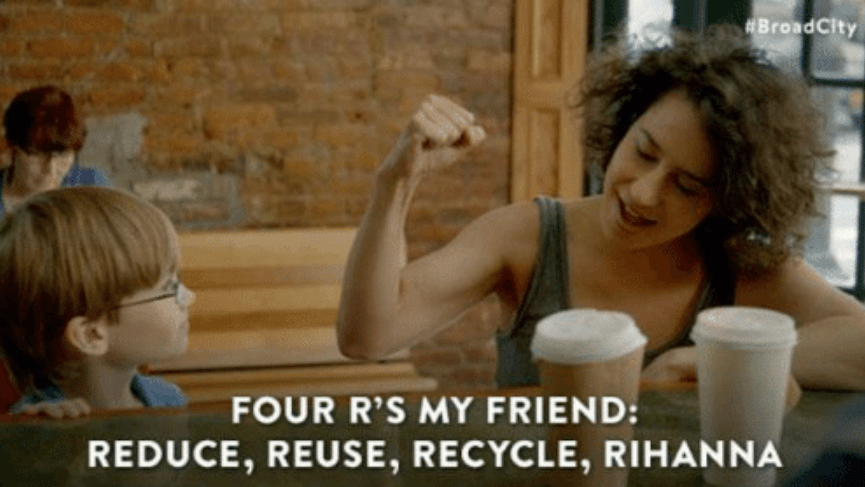
Even though Plastic Free July is rolling to a close, we should continue to minimise our plastic use where possible. It can be overwhelming though, trying to figure out what to cut back on. It’s also easy to fall into the trap of buying something you don’t necessarily need, just because it’s been marketed as sustainable.
Here are some tips to minimise your consumption.
Making the switch to sustainable period products
According to a 2017 report by the ABC, women in Australia use around 10,000 to 12,000 disposable menstrual products in their lifetime. Pads, according to reports, take 500-800 years to decompose in landfills. These are extremely confronting numbers, so if you’re determined to make a personal change, you can give sustainable period products a go. Brands like Modibodi sell products like leak-proof underwear and reusable pads. It will definitely take some adjustment though, so pace yourself.
You can also try period cups, or more conscious period care like biodegradable tampons, pads, and liners.
Actually recycle your soft plastics
If you’re going to start somewhere, you may as well kick it all off with recycling.
If you’re based in Victoria, and would like to spend lockdown 2.0 brushing up on your recycling knowledge, Sustainability Victoria has a handy search tool that’ll tell you what you can or can’t recycle. Literally, you can plug in an item and it will tell you which bin to put it in. So next time your roommate yells, “You can’t recycle that”, you can yell back, “I actually can, you bloody pelican.” True story.
For example: can you recycle an Australian post plastic satchel? The answer is no. The satchel is soft plastic, like cling wrap or chip packets or frozen food bags. But this doesn’t mean the only option for it is trash. You can take soft plastics to REDcycle soft plastic drop-off points at participating supermarkets across the country.
Toot paper with a difference
We all use it, so why not think more sustainably about how we buy it? How We Roll, one of the newest players in the Aussie bog roll game, sell 100 per cent recycled toilet paper, bamboo paper towels, and compostable and biodegradable bin liners. The team have also launched compostable and biodegradable doggy poo bags.
How We Roll has also teamed up with non-profit organisation, One Tree Planted, to grow trees in bushfire-affected areas in NSW. Founded in 2014, the organisation is committed to global reforestation. So for every box sold, one tree is planted. In the month of May, How We Roll revealed it had contributed to the planting of 213 trees – including native and companion trees – in bushfire affecter regions in NSW. In June, that number rose to 976 trees.
Fabric recycling
Textile recycling is a great alternative to just simply throwing out old clothes that can’t be donated. We’re talking about damaged or unsaleable clothing or extremely old sheets and towels.
Planet Ark’s Recycling Near You has listed a handful of organisations that accept items like pre-loved bras and old accessories. Organisations listed include The Uniform Exchange and Shoes for Planet Earth, which provides reused running shoes to those in need around the world. They also accept insoles and spare laces you may have around the house.
Other organisations include Reverse Garbage, where you can donate all sorts of things like film and theatre set materials, haberdashery, timber and plywood, and tools.
You might need to do a bit of research, but some animal rescue and adoption centres also accept towels and blankets as donations.
Choose better coffee pods
It’s no secret coffee pods aren’t exactly great for the environment. Most pods are made from aluminium, a mixture of plastic, and materials like lacquer and silicone. According to Canstar Blue, pods are technically recyclable but the non-biodegradable properties of it are harmful to the environment when not disposed of properly.
To combat this, a number of big coffee brands like L’OR, Moccona, and illy have partnered with TerraCycle to help provide a second life for used coffee capsules. Those who take part in the program basically ship their used pods to TerraCycle, which are then shredded to separate the coffee ground from the aluminium. Then the aluminium is melted so they can be remade into new recycled products. For every one of your shipments that weigh in at over 5 kilograms, you will receive $0.02 per piece of waste, which can be donated to a non-profit or school of your choice.
Even better, you can also choose reusable or 100 per cent biodegradable coffee pods. Tripod Coffee pods are made of 100 per cent plant-based material – no aluminium in sight. The eco-pods can also be composted wholly when disposed of correctly. Tripods are Nespresso compatible, by the way.
PEDESTRIAN.TV‘s editors independently choose and write about products and other stuff we love and think you’ll froth on, too. We have affiliate partnerships so we might get a cut of the revenue from any purchase you make based on our recs. Happy buying.



